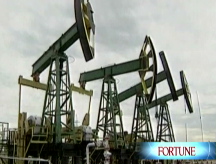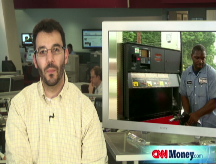Why Wall Street rallied in the face of rising oil
After taking a fairly insouciant attitude about the spike in commodities for quite some time, stock market participants may be changing their tune.
 |
| The Amex Oil index versus the S&P 500 index over the last year. |
 |
| The Amex Oil index versus the S&P 500 index over the last 5 years. |
NEW YORK (CNNMoney.com) -- While consumers, air carriers and lawmakers have been struggling with the burden of surging oil prices, the stock market has remained curiously nonchalant. Until this week.
Stocks tumbled Tuesday and Wednesday as oil prices rocketed past $133 a barrel. On top of that, gas prices inched closer to $4 a gallon and the Producer Price Index (PPI) showed a surprise jump in so-called core wholesale prices, which strips out volatile food and energy.
The selloff wasn't all oil driven. In fact, stocks rallied early Thursday even as oil crossed the $135-a-barrel mark in electronic trading overnight before retreating.
After a strong two-month rally on Wall Street, some type of pull back was expected, though traders say it could also be a sign that the markets are finally starting to react to the jump in crude prices.
"Oil has gone to infinity and beyond," said Kim Caughey, senior equity analyst at Fort Pitt Capital Partners, "and the PPI report has kind of reinforced that oil does matter and is going to show up in other areas of the economy."
Until now, market professionals - and retail investors - have been focused on the the fact that oil only accounts for about 4% of GDP.
But with prices spiking $9 in four sessions and the Fed saying Wednesday that the economy will get worse before getting better, there has been a gnawing feeling that the impact may be broadening.
"There is an inflection point where oil does matter to the stock market and we could be at it," said Greg Church, president at Church Capital. And the $130-a-barrel mark could be it, said Church.
Taking rising oil in stride. Ahead of the two-day selloff this week, crude prices were up more than 35% from the start of the year, while the Dow industrials and the S&P 500 were off less than 4% and the Nasdaq was down less than 6%. Most of those declines occurred in the first quarter and were predicated more on fears of a steep recession amid the credit and housing market crises.
But those fears were tempered in March, after the Fed joined JP Morgan Chase and the government in effecting the rescue of Bear Stearns. Stocks bottomed March 17, for the second time this year. Since then, they have been on a tear, with the S&P 500 rising over 10% through Wednesday's close. The broad average is also off just 11% since hitting an all-time closing high in October.
So while analysts debate whether the worst of the credit crisis is over and consumers feel the pinch in their pocketbooks, the stock market has been behaving as if the storm has passed.
Investors have also been attributing the rise in crude to speculative buying, thereby making it a temporary problem, said Timothy Ghriskey, chief investment officer at Solaris Asset Management.
All of this has helped investors adjust, with little trauma, to rising oil and gas prices, said Rob Lutts, chief investment officer at Cabot Money Management. But that may not last.
The stock market has also shown its own resilience in the face of rising oil prices in the past, and the two-day selloff may just be a blip.
The stock market has already taken its lumps. Between the October highs and the March lows, the Dow and S&P 500 both posted double-digit losses and the Nasdaq dropped more than 20% - the technical definition of a bear market.
That action was the stock market's way of "pricing in" a possible recession, including the ongoing fallout from the credit and housing markets and the run up in oil and gas prices, said Gary Webb, CEO of Webb Financial Group.
Since mid-March, stocks have been generally higher, reflecting an 'enough is enough' philosophy.
"When you see stocks doing as well as they have been, regardless of the last two days, that tells you that the market is accounting for all of the negatives and is looking six to twelve months out," Webb said.
Oil and gas price increases are no surprise. Stock investors have been contending with rising oil prices for several years. The S&P 500 managed to gain 3.5% in 2007, even as oil prices spiked 57% and investors were crushed by the heaviest wave of the credit crisis.
The Dow industrials jumped 16% in 2006, even as oil prices remained in the $60 a barrel area.
You have to go back to 2005 to find the last time higher oil prices coincided with weaker or flat markets. In that year, oil rallied almost 40%, ending the year at $61.05, while the Dow closed out the year with modest losses and the S&P 500 and Nasdaq ended with modest gains.
Bernanke and Co. The apparent disconnect between the direction of stocks and oil prices of late can also be attributed to the Federal Reserve, which has taken significant steps over the last 8 months to cushion the blow of a struggling economy.
That's certainly helped the stock market. Traders like to point to March 17th as a critical date because it's when the Bear Stearns rescue was announced. The following day also marked the six-month point of the Fed's campaign to lower interest rates and make more money available for commercial and investment banks to borrow, a strategy that so far seems to be paying off.
However, on Wednesday, the central bank released the minutes from the last Federal Reserve policy meeting and announced a distinctly bleaker 2008 economic outlook, reviving the threat of a recession.
The energy sector's dominance. Stocks have also been able to thrive because of the weight the energy sector carries within the S&P 500.
Energy accounts for roughly 15% of the S&P 500, said Joseph Saluzzi, co-head of equity trading at Themis Trading, and strong earnings for the sector have managed to temper weakness in financials and other sectors.
"The Exxons and Chevrons have been up, up and away, along with the price of crude, and they're taking all the materials and metals stocks higher," Saluzzi said. Yet, "that could be masking weakness in other sectors."
Don't forget the rest of the world. The U.S. of late has been less the engine that drives the global economy than the caboose, Church said. And that's one of the factors that has helped offset oil prices. ![]()



